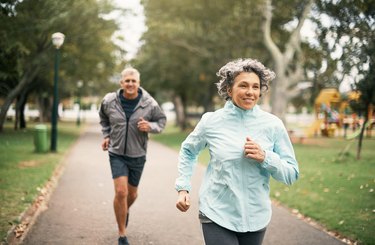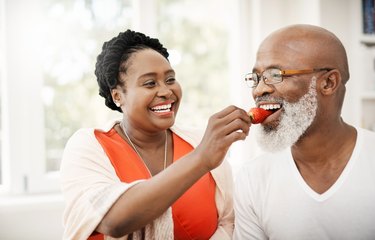
Whether the goal is weight loss, clearer skin or better digestion, many of us have heard that we should be drinking more water. And while just about anyone can probably benefit from more H2O, older adults may want to be especially mindful of their daily water intake.
Why? Well, as we get older, it's harder to stay hydrated.
Video of the Day
Video of the Day
Read on to learn why, and get tips to help ensure you're drinking enough to stay healthy.
Why Dehydration Is Common in Older Adults
A few factors play into why hydration becomes more challenging with age:
1. It's Tougher to Regulate Body Temp
When our body temperature increases due to exercise or exposure to a hot environment, "our body relies on specialized responses to facilitate heat loss and keep body temperature within safe limits," explains Robert Meade, MSc, a doctoral candidate in the Human and Environmental Physiology Research Unit of the University of Ottawa.
This includes increasing blood flow to the skin, which helps bring hot blood to the surface, where the heat can then be transferred to the environment, and the secretion of sweat, which removes heat from the body as it evaporates, he adds.
But aging decreases your ability to sweat and to tell when you're becoming overheated, according to the U.S. National Library of Medicine. Indeed, in a September 2020 study in The Journal of Physiology co-authored by Meade, researchers gave 10 young men (average age of 25) and 10 older men (average age of 61) IVs of saline solution to simulate dehydration, then had them bike for an hour in dry heat while devices tracked the amount of heat lost from their bodies.
The researchers found that dehydration didn't affect heat loss or body temperature in the older men. In other words, their bodies didn't attempt to adjust to prevent further dehydration.
2. We Don't Feel as Thirsty
"We're not able to maintain the same level of thirst" as we get older, Ronan Factora, MD, internal medicine doctor and geriatrician at the Cleveland Clinic, tells LIVESTRONG.com.
This is at least in part due to changes in the brain. A region called the lamina terminalis controls our thirst. But as we add candles to our birthday cake, the neurons in this region appear to become less sensitive to signs of dehydration, according to an April 2013 study in Endocrinology & Metabolism Clinics of North America.
3. We Have Less Water in Our Bodies
According to the above study, as we get older, we lose about 5 to 10 percent of the water in our bodies. Because we have less water, we're more prone to dehydration, Dr. Factora says.
Think about it like this: If you have a glass filled with a cup of water and you pour out one ounce, you're losing about 12 percent of the water. But if that same glass starts with a three-quarters cup of water and loses one ounce, that's almost 17 percent of the water gone.
4. Some Medications Cause Frequent Urination
Diuretics for high blood pressure and other heart conditions, some antihistamines, laxatives, some psychiatric drugs and other medications can make you urinate more, leading to dehydration. And older adults may take these medications more often, as they're at greater risk of hypertension, heart disease and constipation, according to the Mayo Clinic. They are also more likely to take multiple prescriptions, according to a poll of 1,400 adults by the Kaiser Family Foundation.
"These can deplete the total body water a person has," Dr. Factora says.
5. We May Drink Less
In a national poll from the University of Michigan of more than 1,000 women between the ages of 50 and 80, more than half said they sometimes leak urine. Other research published in Reviews in Urology in 2009 estimates that 8 percent of men ages 65 and older experience urinary incontinence.
Additionally, as we age, nocturia, or getting up during the night to pee, becomes more common. This is believed to be due to a reduction in bladder capacity and changes in hormones that influence urine output, according to a 2016 study in Current Aging Science.
Because of incontinence and nocturia — along with age-related mobility issues that make getting up to pee more burdensome — some older adults choose to reduce their water intake. This can inadvertently lead to dehydration.
How Older Adults Can Stay Hydrated

Just as several things can increase your risk of dehydration, there are also several ways to support good hydration. And the benefits of doing so are pretty profound: According to a January 2023 study in eBioMedicine that included more than 11,000 people, staying well-hydrated is linked to a longer, healthier life. It also seems to lower your risk for chronic conditions like heart and lung disease.
If you need more help than the tips below, talk to your health care provider or a registered dietitian.
1. Check Your Pee
"Don't rely on your sense of thirst [to tell you when to drink more water], because that's blunted," Dr. Factora says.
But the standard "eight 8-ounce glasses of water a day" also may not be best for you.
"It's hard to say one size fits all. If you are taller or have a higher body mass index, you'll need more water compared to someone who is smaller," he adds.
Lastly, if you have kidney problems or retain water for any reason, drinking too much can exacerbate the issue.
So Dr. Factora recommends looking at the color of your urine. The goal is a light, clearish yellow color, he says. If your pee is darker, it's a sign that you need to drink more water.
2. Space It Out
Chugging water is not the solution if your urine is dark. This may cause bloating and the need to find the bathroom, stat. So most days, it's best to space out your water consumption.
Consider keeping a water bottle nearby at all times and making a goal to sip all day long, refilling the bottle as necessary.
3. Cut It Off
Dr. Factora recommends stopping water consumption about two hours before going to bed. Otherwise, you may have to get up several times during the night to pee, and that of course can ruin your sleep.
4. Make Water More Exciting
Plain H2O is best, but it's also pretty boring, which can make it harder to stay hydrated. Consider adding a bit of fresh fruit juice or buying unsweetened flavored water, Dr. Factora says.
You can also play with temperature. If it's hot outside, add a few ice cubes to your glass. If it's a cold day, try warming a mug of water in the microwave to make it more enticing.
5. Watch Your Caffeine
Caffeine can act as a diuretic and cause you to lose water, Dr. Factora says. So be mindful of how much coffee, caffeinated tea, cola and other caffeinated beverages you down.
"That doesn't mean you can never drink them, but you may need to balance them out by drinking more caffeine-free drinks," he says.
6. Eat Your Water
Many fruits and vegetables have high percentages of water, so they also count toward your hydration goals, Dr. Factora says. In fact, food accounts for 20 to 30 percent of our water intake, according to an October 2016 Nutrients study. Consider the below foods, which all consist of at least 80 percent water, according to an August 2010 paper in Nutrition Review:
- Cantaloupe
- Strawberries
- Watermelon
- Lettuce
- Cabbage
- Celery
- Spinach
- Cooked squash
- Apples
- Grapes
- Oranges
- Carrots
- Cooked broccoli
- Pears
- Pineapple
7. Don't Exercise in Excess Heat
"Generally, people should avoid exercising in temperatures greater than 90 degrees Fahrenheit — especially when the humidity rises above 10 percent — if they are unacclimated to the heat," says certified personal trainer Sabrena Jo, director of science and research for the American Council on Exercise. On those hot days, try to work out in the morning or evening when it's cooler, or find some indoor workouts to do instead.
If you want to acclimate yourself to the heat, don't go all-out right away. "Start with short bouts of 10 to 15 minutes of low-intensity exercise such as walking for several weeks to allow your body to adapt to exertion in the heat before increasing the time and rigorousness of the activity," Jo recommends.
8. Seek Help When Necessary
If you find yourself feeling lightheaded, dizzy, disoriented or confused, you may be dehydrated.
"Your blood pressure is dropping because there's not enough fluid in your bloodstream to bring to the brain," Dr. Factora explains.
If you have minor symptoms, he recommends drinking water and avoiding heat or any mentally challenging tasks (like work) until you feel better. If your symptoms don't subside or get worse, seek medical care immediately, as these symptoms could become life-threatening.
- The Journal of Physiology: "Ageing Attenuates the Effect of Extracellular Hyperosmolality on Whole‐Body Heat Exchange During Exercise‐Heat Stress"
- U.S. National Library of Medicine: "Aging Changes in Vital Signs"
- Endocrinology & Metabolism Clinics of North America: "Age-Associated Abnormalities of Water Homeostasis"
- Mayo Clinic: "High Blood Pressure (Hypertension)"
- Mayo Clinic: "Heart Disease"
- Mayo Clinic: "Constipation"
- Kaiser Family Foundation: "Data Note: Prescription Drugs and Older Adults"
- Reviews in Urology: "Male Urinary Incontinence: Prevalence, Risk Factors, and Preventive Interventions"
- Michigan Health Lab: "Nearly Half of Women Over 50 Experience Incontinence, but Most Haven’t Talked to a Doctor"
- Current Aging Science: "Age-Related Sleep Disruption and Reduction in the Circadian Rhythm of Urine Output: Contribution to Nocturia?"
- Nutrients: "Contribution of Water from Food and Fluids to Total Water Intake: Analysis of a French and UK Population Surveys"
- Nutrition Review: "Water, Hydration and Health"
- eBioMedicine: "Middle-age high normal serum sodium as a risk factor for accelerated biological aging, chronic diseases, and premature mortality"
Is this an emergency? If you are experiencing serious medical symptoms, please see the National Library of Medicine’s list of signs you need emergency medical attention or call 911.